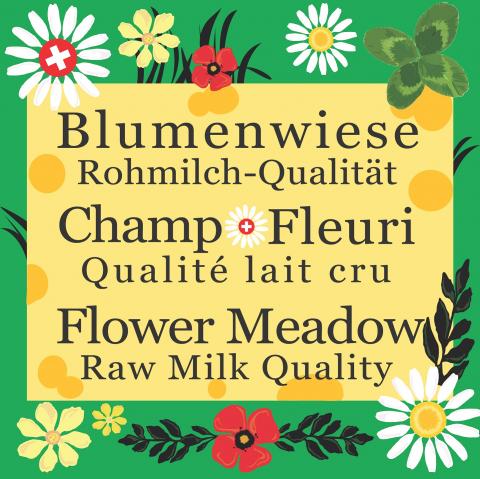What is Flower Meadow Cheese made from untreated raw milk
Or: Why almost all cheeses are the same taste.
Have you noticed it too?
The cheeses are getting more and more boring. All the character is gone. I always notice it, when I sit on the jury at international competitions.
One time I had to do 50 industrial Cheddar blocks to taste and rate. Each tasted like the other... It was really
impossible to say which is better.
But why is that? Quite simple: because you can no longer taste the flower meadow.
When pasteurising and processing, the whole story, the whole Taste, the whole flower meadow removed.
Every time I come to the raw milk cheeses, I am overwhelmed by the variety of the
Flavours. Of course, not every cheese tastes good to me, but they have character and it is never boring.
That's why I decided to create a new quality label for the cheese with the full flavour, for the Creating cheese with character.
I thought for a long time about how to define this label and, while trying out more cheese I suddenly knew: what makes these raw milk cheeses special are the Flower meadows that you can taste.
What is a flower meadow cheese?
The short definition is simple: it is cheese made with untreated raw milk. With it, but also clear what is involved, I have drafted a specification which you can read here. https://www.affineurwalo.ch/en/cheese/duties-booklet-flower-meadow-cheese
By the way: Do you know the story?
There was once a ... who had to take 3 omega three capsules every day. she hated pills and fish wasn't her thing either. Then someone told her that Flower meadow cheese from the alp contains just as many ogea3 fatty acids as a Fish meal. She has been happy ever since, because the alpine cheese also tastes fantastic.
Why does the Flower Meadow cheese taste so amazing?
The traditional production from untreated raw milk guarantees that the full flavour is and, of course, the vitamins and trace elements in the milk are preserved.
Most cheeses are made from industrial milk. This milk is so strongly purified so that it tastes completely neutral in the end. But not only the flavours disappear, but also some of the vitamins and trace elements.
Apart from that: If you had the choice between cheese from a cow that was kept in a barn fermented silage or a cow that is raised in the summer on flower meadows romps around and eats dried hay in winter: wouldn't you then also choose the flower meadow cheese? From cows that spend their summers on alpine meadows with munching on herbs and tasting their satisfaction?
If you are a pill fan, then take the food supplement capsules instead. All others I recommend 200 g of alpine cheese.
But please don't tell anyone, otherwise we won't have enough cheese!
FAQs:
How do you recognise the flower meadow cheese?
It's very simple: Look out for this sign

or ask at the
Counter.
Yes, but isn't raw milk cheese dangerous?
No! The production method ensures that in extra-hard, hard and semi-hard cheese no dangerous germs can survive. This works, first we paralyse the barteria with cold, then we heat them long and hard with cheese curd, and those that are still alive are treated with acid, as the PH value drops sharply during production.
In other words, first the bad germs are paralysed, then cooked and finally droped in acid not even Iron Man would survive that.
https://www.affineurwalo.ch/en/news/are-flower-meadow-cheeses-made-untreated-raw-milk-safe
The lactose always gives me such a bloated belly, I just can't tolerate it.
You don't have to be afraid the good bacteria that ripen the cheese feed on the lactose (milk sugar). After 4 - 5 months nothing remains.
But now we've talked enough. Just try it!
